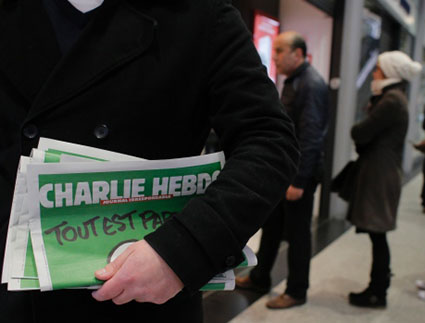
PARIS (France24/Pacific Media Watch): A defiant Charlie Hebdo has gone on sale in five languages and in more than 20 countries, splashing a cartoon purporting to be Muhammad on its front cover a week after jihadist gunmen stormed the satirical weekly’s offices killing 12 people.
The newspaper normally prints 60,000 copies a week. This week’s print run will be five million (up from three million announced on Tuesday), distributed over the next two weeks.
It is a record for any French newspaper, with versions being printed in Spanish, Arabic, Italian, Turkish and English for the first time.
Across Paris on Wednesday, even at 6am, many shops and kiosks had already sold out.
At Belleville in Paris’s 19th arrondissement (district), the newspaper kiosk at the metro station had sold its 150 copies within minutes of opening at 6am.
The paper’s front cover shows a turbaned man (not explicitly the Prophet Mohammed) shedding a tear and declaring that he too “is Charlie” – “Je suis Charlie” was the slogan of a huge outpouring of grief and solidarity in France in the days that followed the attacks. The front-page figure adds that “all is forgiven”.
Global response
The global attention following last week’s attacks – which saw another gunman kill four hostages in a Jewish supermarket in Paris – has seen demand for Charlie Hebdo explode as far away as India and Australia.
While the front page had been widely shared online ahead of publication, many newspapers in both Muslim countries and in the West refrained from printing the cartoon because of blasphemy laws and also sensitivity over reproducing an image of the Prophet, which is considered offensive by Muslims.
Charlie Hebdo’s front page was not reproduced by the mainstream media in the US, where any kind of religious satire is frowned upon, although the White House reaffirmed its “absolute support [of the] the right of Charlie Hebdo to publish things like this”.
In Egypt, the chief imam at the al-Azhar mosque, an institution widely-seen as the centre of the Sunni Muslim faith, condemned Charlie Hebdo’s decision to lead its latest issue with a cartoon of the Prophet, calling it an “incitement to hatred”.
The Dar al-Ifta, which represents Egyptian Muslims, called the new front page a “provocation”, while in Shiite-dominated Iran, conservative news site Tabnak accused Charlie Habdo of “once again insulting the Prophet”.
Islamophobia and France’s far right
Paradoxically, Charlie Hebdo is one of France's loudest voices against racism, whose principal target of abuse has always been France’s far-right National Front (FN, whose founder Jean-Marie Le Pen has been convicted numerous times of racism and anti-Semitism). The FN is widely seen as virulently Islamophobic.
But the newspaper’s decision in 2006 to reprint cartoons of Mohammed published in Danish daily Jyllands-Posten brought so much ire on Charlie Hebdo that its editors decided to publish regular cartoons lampooning radical Islamists as well as depictions of Muhammad himself, who, in one case, is shown lamenting the difficulty of being “followed by complete idiots”.
Inevitably, Charlie Hebdo became the focus for widespread disapproval in France’s large Muslim community, and the two French-born gunmen who entered the newspapers offices last Wednesday, murdering 12 people, ran out shouting that they had “avenged the Prophet”.
The survivors of the attack have defended their caricatures of Islam and Muhammad.
“The Muhammad we have portrayed is a much nicer character than the version of Muhammad brandished by the attackers,” said one member of the weekly’s editorial staff.
“And if we can get our ideas read across the world, it is we who are the ultimate winners,” added Charlie Hebdo’s editor-in-chief Gérard Biard.
On Tuesday, French Prime Minister Manuel Valls set out the government’s updated response to terrorism, following last week’s murderous assault on the magazine and a Jewish supermarket.
But he insisted that “blasphemy does not feature in the laws of France, and it never will”.
Special background feature on Cafe Pacific
This work is licensed under a Creative Commons Attribution-NonCommercial 3.0 New Zealand Licence.




